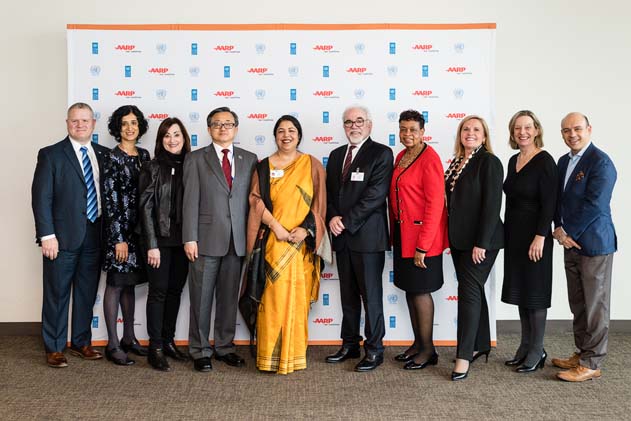 January 30, 2018
January 30, 2018
NEW YORK – During the 56th session of the Commission for Social Development (CSocD56), over 150 government officials, policymakers, activists, and thought leaders gathered at the United Nation Headquarters in New York to participate in the 2018 AARP–UN DESA Briefing Series. The 11th annual briefing series, entitled “Taking a Different Course for a World Free of Poverty”, provided stakeholders with an understanding of the progress made and challenges faced in eradicating poverty and insecurity in old age.
The event, held by AARP and the UN Department of Economic and Social Affairs, in partnership with the UN Development Programme, facilitated a discussion on how older persons could be taken into greater account in poverty eradication programs and into the 2030 Sustainable Development Agenda.
Raj Kumar, President and Editor-in-Chief of Devex, a media platform for the development community, opened the program. He explained that while progress has been made on increased longevity and lower fertility rates, this progress has led to new challenges.
“We cannot ignore something we often really do ignore,” said Mr. Kumar “And that is the process of aging and older people in our societies, and their rights, and their inclusion”.
Beth Finkel, State Director of AARP’s New York Office, delivered the welcoming remarks. Recently, with the support of key partners, the AARP New York Office launched the Disrupt Racial and Ethnic Disparities report. The report examined the disparate health and economic outcomes for the state of New York’s 50+ ethnic populations.
“It’s striking,” said Finkel, “The disparities are so striking in both health, access to health, access to livable communities and access to economic security”.
The United Nations Under-Secretary-General for Economic and Social Affairs, Liu Zhenmin, gave the introductory remarks. He outlined the Commission of Social Development’s efforts to support people-centered, inclusive development. “These efforts must include older persons, front and center,” he said. He noted that data on poverty rates that are disaggregated by age are lacking, and that, on average, older women fare worse than men due to discrimination in access to education.
Lance Robertson, the Assistant Secretary for Aging at the Department of Health and Human Services, delivered the keynote address. He outlined the U.S. Government’s national support system that supports the health and economic security of millions of older Americans. He highlighted the Legal Assistance for the Elderly Program, which helps prevent financial exploitation, abuse and fraud targeted at older persons.
Mr. Robertson also noted that many programmatic insights were gained from housing disability and aging support programs in the same Federal Agency.
The expert panel discussion, moderated by Raj Kumar, continued to discuss how the conversations around senior poverty fit into the broader anti-poverty agenda of the Sustainable Development Goals.
Rosemary Kalapurakal, Lead Advisor for the 2030 Agenda for Sustainable Development at the UN Development Programme, explained the role of the mega trends of population changes–changes in demographics, information technology, conflict, migration and climate–have in compounding old age poverty.
“All of these come together in the perfect storm when you look at the conditions in which older people, and especially the extreme old, find themselves,” said Ms. Kalapurakal. Intergenerational structures that traditionally supported older persons–such as family cohesion–have frayed due to these mega-trends of population change. Because of these changes, many older persons in developing countries need additional support from the state.
Continuing on this point, José António Vieira da Silva, the Minister of Solidarity, Employment and Social Security of the Government Portugal acknowledged that links between families are weaker than before. The support of communities and civil society is essential to compensating for this change.
The Minister also emphasized the importance of lifelong learning and training in alleviating elderly poverty. “It was a terrible mistake to consider 50 year olds too old for the labor market,” he said, “And many countries are suffering the costs.”
Lisa Marsh Ryerson, President of the AARP Foundation, expanded on the Minister’s points. She noted that giving older persons access to upskilling, ongoing training programs and higher education at all levels is essential to preventing poverty at old ages.
President Ryerson cautioned that these programs can only be effective if employers are willing to hire older workers. The AARP Foundation has addressed this by partnering with employers to ensure that they have a willingness to hire older workers. "It remains very difficult for unemployed older adults to return to the workforce here in the United States,” said President Ryerson.
At the end of the briefing, Rosemary Lane, Senior Social Affairs Officer at the UN Focal Point on Ageing, delivered the closing remarks. A lifecourse approach, her remarks concluded, is the key to old age poverty reduction. Reduced earning capacities, from gender and age discrimination, lead to lower pensions and greater financial insecurity for older persons.
In closing the event, Lane hoped that the upcoming the third review and appraisal of the Madrid International Plan of Action on Aging would “ensure that this time, older people are not left behind”.
Related Resources:
AARP Foundation, AARP Foundation Announces Urban Institute Report Showing First Comprehensive View into the 13MM Low Income Older Workers.
Kratz, Stacey, AARP New York, Disrupting Racial and Ethnic Disparities.
United Nations, 56th Session of the Commission for Social Development.
United Nations, The Madrid Plan of Action and its Implementation.
United Nations, Economic Inequalities in Old Age 2017.